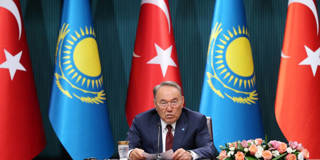The resignation of Nursultan Nazarbayev, the only president that independent Kazakhstan has ever had, marks a critical juncture for the country. Nazarbayev came to power at a time of profound and unexpected change, and his semi-departure could have equally unpredictable consequences.
ASTANA – On March 19, the only president that independent Kazakhstan has ever known, Nursultan Nazarbayev, announced his resignation after almost three decades of near-absolute power. In a televised speech, Nazarbayev praised the country’s achievements and called on its youth to build a bright future.
Yet it was not a full farewell, because Nazarbayev said that he was not leaving the political scene. The big question now is what comes next for Kazakhstan.
Although Nazarbayev’s resignation came as a surprise, his promise to remain in politics was years in the making. He previously received the titles of First President (2000), Leader of the Nation (2010), and, in 2017, Elbasy, a Kazakh word meaning head of the nation or people. Because of his “historic mission,” he was given the lifelong right to present initiatives on state-building, domestic and foreign policy, and national security. What’s more, Kazakh state bodies are obliged to consider his proposals.

ASTANA – On March 19, the only president that independent Kazakhstan has ever known, Nursultan Nazarbayev, announced his resignation after almost three decades of near-absolute power. In a televised speech, Nazarbayev praised the country’s achievements and called on its youth to build a bright future.
Yet it was not a full farewell, because Nazarbayev said that he was not leaving the political scene. The big question now is what comes next for Kazakhstan.
Although Nazarbayev’s resignation came as a surprise, his promise to remain in politics was years in the making. He previously received the titles of First President (2000), Leader of the Nation (2010), and, in 2017, Elbasy, a Kazakh word meaning head of the nation or people. Because of his “historic mission,” he was given the lifelong right to present initiatives on state-building, domestic and foreign policy, and national security. What’s more, Kazakh state bodies are obliged to consider his proposals.